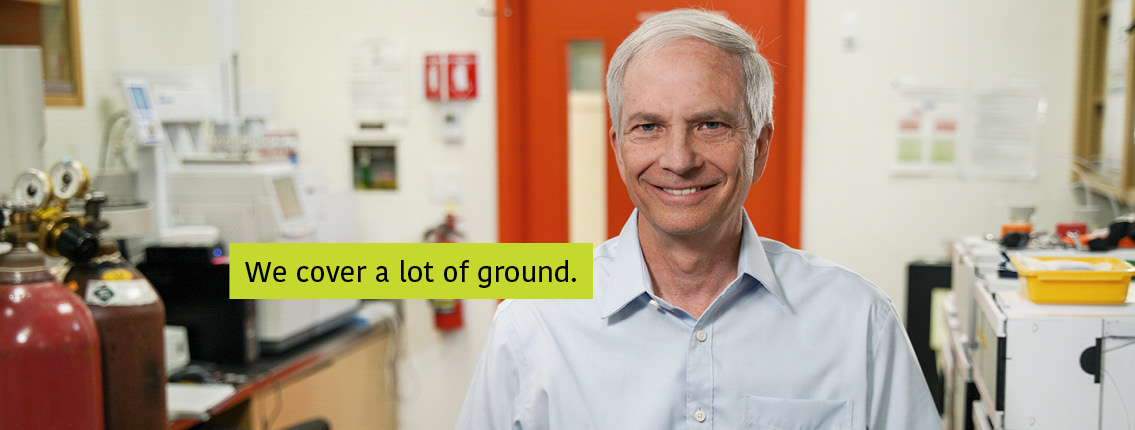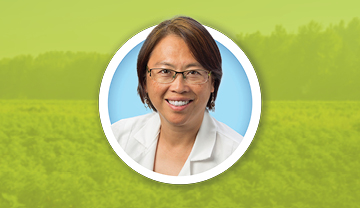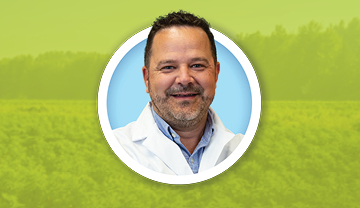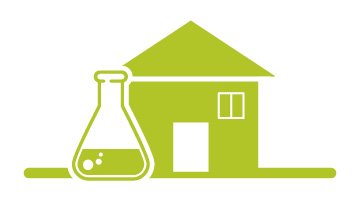
Dr. Charles Forney
Research Scientist – Postharvest Physiology
Kentville Research and Development Centre
Why did you become a scientist?
At first, I was interested in studying trees, and I started my undergraduate studies in forestry. But in my spare time, I loved gardening. So when I had the chance to work with fruits from both trees and plants, studying horticultural physiology seemed like a natural fit for me.
Meet Dr. Charles Forney
Video transcript
[Upbeat, cheerful music begins.]
[Charles Forney walks down a hallway holding a test tube rack in a research centre.]
Voice of Charles Forney: Most people don't realize that fresh fruits and vegetables are actually alive,
[Pan to Charles entering a room where a research assistant looks at a computer screen. Charles places the test tubes into a scientific machine.]
Charles: ...even after they are removed from the plant. A lot of the work we are doing is to try and look at the secret life of those fruits and vegetables and understand what's going on.
[A green geotag icon appears on the bottom of the screen with text.]
Text on screen: Kentville, Nova Scotia
[Cut to Charles in a lab being interviewed.]
Charles: My name is Charles Forney, I am a research scientist and my field of study is post-harvest physiology.
[A green and white banner crosses the bottom left corner of the screen with text on it.]
Text on screen: Charles Forney. Research Scientist – Post harvest physiology. Agriculture and Agri-Food Canada.
[Cut to close up pan over blueberry bush.]
Charles: Ultimately, we are trying to improve the overall quality of blueberries.
[Cut to close-up pan over blueberries that have been harvested on a table.]
Charles: so if we can understand the chemistry underlying the flavour of the fruit,...
[Cut to Charles in a lab using a machine to test blueberry ripeness.]
[Cut to close up of Charles at computer screen monitoring results.]
Charles:...we are then able to assess how we handle the fruit, how it's stored, how it's transported...
[Cut back to Charles in lab interview.]
Charles:...and how all of those processes impact flavour.
[Cut to a lab assistant placing blueberries in a jar on a scale in a lab.]
[Cut to close up of a machine mixing blueberries with a chemical mixture.]
Charles: To do this we actually capture the volatile compounds that are released by the blueberry,...
[Cut to an eyedropper placing liquid blueberry mixture into a text tube.]
[Cut to Charles checking in with a lab assistant who is sitting at a computer.]
Charles: ... analyze them using an instrument called a gaschromatograph mass spectrometer.
[Cut to close up of a machine placing test tubes filled with different blueberry mixtures into sample slots.]
[Cut to close up of lab assistant looking at computer.]
Charles: But then we still have the question of which of those compounds can humans smell or sense.
[Cut back to Charles in lab.]
[Cut to clip of a sign on a door handle with text.]
Text on sign: Do not enter. Sniffing panel in progress.
Charles: So to determine that we actually use humans,
[Cut to clip of panel member sniffing odour from a tube attached to a machine as she selects different blueberry samples from a screen.]
[Cut to close up of panel members nose in sniffing tube.]
Charles: so we have developed a trained panel here at our research centre and they will actually smell the compounds and identify and describe which ones are contributing to the blueberry aroma and flavour.
[Cut back to Charles in lab.]
Charles: We can go back and potentially modify handling procedures or develop new technologies to enhance or maintain desirable flavour.
[Cut to an ending text screen on a white backgorund.]
[Upbeat, cheerful music fades out.]
Text on screen: Learn more at agr.gc.ca/fields-of-science. We cover a lot of ground.
[Screen fades into the Canada wordmark. The uplifting, rhythmic music fades out.]
Profile
What do you like the most about your job?
I like the variety of work each day: planning research, meeting with growers, analyzing data, making presentations, evaluating fruit, and more.
What is the coolest fact about your field of science?
Fresh fruits and vegetables are living and, therefore, are complex and dynamic. It is fascinating to unravel how they react to being handled once they are harvested, and how their best qualities can be improved during production, harvesting, and marketing.
What was the biggest challenge you have ever encountered in your career?
Writing scientific papers is always a challenge. No piece of research is ever perfect, and I tend to be a self critic and always find faults and limitations.
If your field of science was a “Top 20” song, what would it be called?
A few existing titles that come to mind are "Blueberry Hill" by Fats Domino, and "Strawberry Fields Forever" by the Beatles.
What is the funniest thing that has happened to you at work?
Being an elf at a Christmas party and having my face covered in whipped cream.
Do you have a nose for picking—the best apples?
Fall is a beautiful time of year to wander grocery stores aisles, filled with the smell of freshly picked apples from Canadian orchards.
Smelling apples is part of the job for Dr. Charles Forney and his team as they sniff out Canada's next best-selling apple.
"Whether food is desirable or not usually depends on our senses—mainly, the flavours, aromas, appearance, and textures of the foods we buy", explains Dr. Forney. This is especially true when people choose fresh fruits and vegetables.
The aromas in apples are as complex as those in wine. In studying two popular apple varieties from Canada and the United States, Dr. Forney and his team found odours ranging from sweet, fruity, spicy and floral to burnt toast, onion, garlic and even skunk.
Dr. Forney, a postharvest physiologist at Agriculture and Agri-Food Canada's Kentville Research and Development Centre in Nova Scotia, explains that "our team is exploring whether breeding can be used to get rid of undesirable odours and enhance desirable aroma in apples. It's one thing to identify aromas but it's another to identify the genes behind them."
Monitoring gases apples release as they ripen may also help predict how long the fruit will store. Dr. Forney and his team recently found a relationship between volatile chemicals released from Ambrosia apples and the likelihood of them developing "soft scald", an undesirable browning condition.
"The apples release compounds that indicate the fruit will breakdown in storage. We often try to control this by adjusting the temperature at which we store apples, but if we can determine what genes are actually controlling the breakdown and breed them out then we are really off to the races. Apples will be able to last longer in storage and on our shelves."
Less food waste and tastier apples —an environmentally friendly solution all based on a good nose.
So the next time you're in the produce aisle, pick up a Canadian apple and breathe in the work of a team of passionate scientists who love all things apple!


